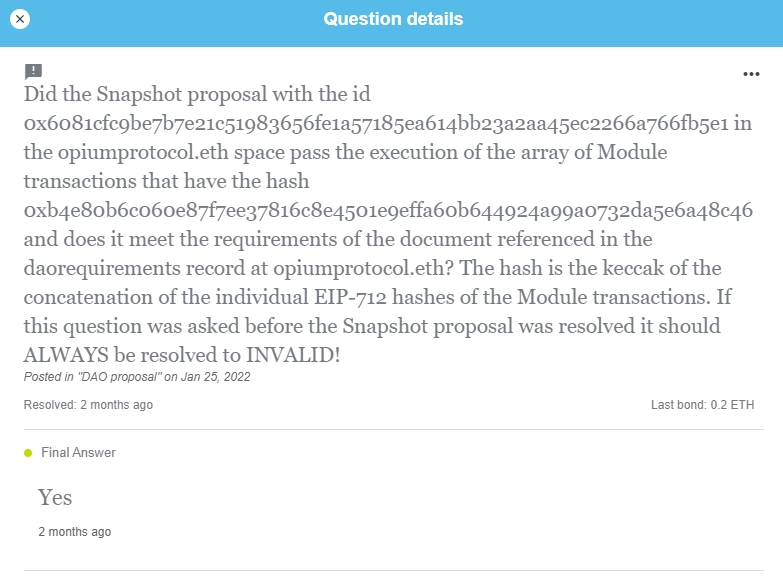Decentralization Tool
Panther uses Reality.eth in order to verify real-world events for smart contracts.
Built by Social Minds Information Systems, it is a crowd-sourced oracle dApp for user-defined questions. This means that whenever Panther puts out a DAO proposal, Reality.eth verifies the outcome of the vote. If this outcome is positive, the transactions embedded within the proposal can be executed permissionlessly by anyone via the Zodiac Reality module. Reality.eth achieves this (with the help of the Panther team) through a clever system that crowdsources answers on-chain.
Reality.eth allows anyone to set up a question and tie funds to its answer. It works through a system of bounties and bonded deposits.

The answer to the question can be binary (yes/no), a timestamp, one option out of a list, or multiple options. An arbitrator is also appointed. The arbitrator can be a DAO or a decentralized on-chain open-source system such as Kleros.
The question asked can then be answered and verified by anyone who wishes to claim the funds tied to it. In Panther’s case, this question is: “Did the Panther DAO approve proposal X on Snapshot at (ADDRESS)”? Should the question receive an initial answer (which has to be accompanied by a bond), it may either go uncontested (which awards the answerer the askers’ tied funds) or contested (which starts a bidding war, as each new contester has to introduce progressively higher bonds).
Because Reality.eth is game-theoretically modeled, the system resolves after a given number of attempts, after which the bidding war stops or the arbitrator is called in. The owner of the answer selected by the arbitrator receives the entire amount in bonds from all submitted answers, thus permanently settling the question.
After a question is settled, both the question and its answer remain on the blockchain as verified decentralized information accessible by any smart contract on the same network. Since this information is considered to be true, it can be used by the Zodiac Reality Module — developed by Gnosis — to execute the transactions tied to the proposal.
One of the most exciting uses for Reality.eth’s system is to verify a voting outcome. Thanks to the Zodiac Reality Module, deployment can be automated for changes to be instantly implemented should a given proposal pass.
Panther has been using Reality.eth and the Zodiac Reality Module to implement DAO proposals since Panther DAO Proposal #2. This process makes crafting proposals a lot more difficult since they have to be meticulously created to work as intended from the very first deployment. Panther accepts this trade-off to favor progressive decentralization.
As of writing, Reality.eth can work on the Ethereum Mainnet, Polygon, Binance Smart Chain, among other Layer-1s, as well as Layer 2 protocols such as Optimism and Arbitrum.
Reality.eth also checks all of the following boxes for Panther:
It leaves the outcomes and governance in the hands of the DAO.
It is fully compliant, as anyone can see on-chain that the proposals to the Panther DAO are only merged after a vote by $ZKP holders.
It allows users to verify their trust in the Protocol and is therefore decentralized. As opposed to blindly trusting developers, the Panther community and DAO can publicly see who the Panther team’s arbitrator is, raise questions about their qualifications, analyze the code in every proposal, and contest Reality.eth calls if they feel the need.
This system makes Panther more transparent, decentralized, team-agnostic, and validates the governance use case of $ZKP.
Last updated